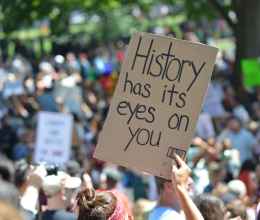
Most people shudder when they hear about the Westboro Baptist Church’s protests at funerals, particularly the funerals of soldiers who died in active service in Iraq and Afghanistan.
The protests are disrespectful and painful to the soldiers’ families, and, as political rhetoric goes, they are far from sophisticated.
But can we use the law to silence those protests?
This is a fundamentally American question.Our First Amendment guarantees a robust marketplace of ideas—even ideas that we despise.
In a resounding 8-1 decision yesterday, the Supreme Court reaffirmed that we must allow even hurtful speech to ensure that freedom is guaranteed for all. There is no “funeral exception” to the First Amendment.
In Michigan, recent experience has taught us that when our legislators try to stifle hateful speech at funerals, their efforts end up backfiring and punishing innocent people.
The ACLU is challenging Michigan’s funeral protest statute on behalf of Lewis Lowden, close friend and mentor of a soldier from Michigan who died in Iraq.
Lewis and his wife Jean were invited to the funeral by the soldier’s family, but in the middle of the funeral procession they were arrested and taken to jail. Why?
The van they were driving—and had driven for years—had signs and bumper stickers criticizing George W. Bush and Dick Cheney. According to the police, they were “protesting” at a funeral (read more).
The ACLU is challenging Michigan’s funeral protest statute on behalf of Lewis Lowden, close friend and mentor of a soldier from Michigan who died in Iraq.
Lewis and his wife Jean were invited to the funeral by the soldier’s family, but in the middle of the funeral procession they were arrested and taken to jail. Why?
The van they were driving—and had driven for years—had signs and bumper stickers criticizing George W. Bush and Dick Cheney. According to the police, they were “protesting” at a funeral (read more).
Lewis, of course, doesn’t support the Westboro funeral protesters any more than the rest of us.
But he does support the Bill of Rights, including the right to speak out on issues of public importance.
He also knows first-hand that when we make special rules and laws for funeral protesters, everyone loses.
And in that way, the Supreme Court’s decision yesterday was a victory for Lewis and Jean Lowden, and a victory for all Americans.
By Dan Korobkin, staff attorney
But he does support the Bill of Rights, including the right to speak out on issues of public importance.
He also knows first-hand that when we make special rules and laws for funeral protesters, everyone loses.
And in that way, the Supreme Court’s decision yesterday was a victory for Lewis and Jean Lowden, and a victory for all Americans.
By Dan Korobkin, staff attorney
